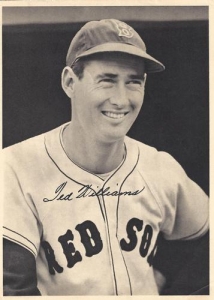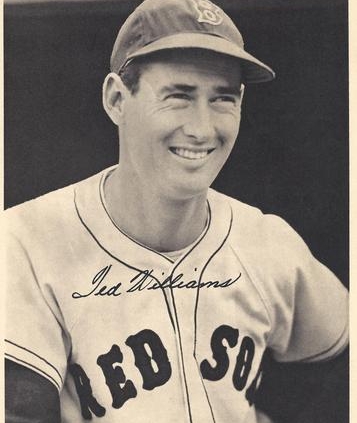May 5, 1948: Ted Williams records three outfield assists in one game
 The “greatest hitter who ever lived”? Ted Williams said his goal in life was to have people say, “There goes Ted Williams, the greatest hitter who ever lived.”1 Very few would say he wasn’t in the conversation. He was not particularly known for his defense, though most judged him at least adequate in playing Fenway Park’s difficult left field.2
The “greatest hitter who ever lived”? Ted Williams said his goal in life was to have people say, “There goes Ted Williams, the greatest hitter who ever lived.”1 Very few would say he wasn’t in the conversation. He was not particularly known for his defense, though most judged him at least adequate in playing Fenway Park’s difficult left field.2
Dom DiMaggio, who played center field in Boston from 1940 through 1952, when not away on military service, said that people often overlooked one thing about Williams – “his ability as an outfielder.” He added, “As the center fielder who played next to him for 10 seasons, I can vouch for his talent on defense. He knew as much about the left field wall at Fenway as he did about hitting. He covered a lot of territory, had a strong arm, and always threw to the right base because of his sharp baseball instincts. We never bumped into each other in all our years together because we communicated so well, many times without saying a word. But Ted never got the credit he deserved as an outfielder because people always focused on his phenomenal performances as a hitter.”3
Over the course of his 19 seasons in the majors, Williams had a career fielding percentage of .974. He had his share of errors – 113 of them.4 His fielding appeared to improve over time; in his first four seasons he made 19 errors, 13 errors, and then 11 and 10, but never again went into double digits. The 113 errors stack up against a total of 4,413 chances. The other 4,300 chances were error-free.
Williams had 140 outfield assists in his career. There were more in his younger days; he had at least 10 assists in each of his first 13 major-league seasons, except for 1946. After 1951, there was never a year in which he had more than seven.
In only two games among the 2,292 in which he played did he commit two errors. They were both in doubleheaders, in the second game of the July 1, 1941, twin bill at Yankee Stadium (and both in the third inning) and on July 7, 1946 at Washington in the first game.
There were four games in which Williams had two assists and this one game in which he had three. The other two-assist games were on August 24, 1940 (first game of doubleheader), against the visiting Detroit Tigers; May 23, 1947, in Yankee Stadium; May 16, 1948, against the visiting Washington Senators; and April 23, 1949, against the visiting New York Yankees. It is interesting that there were only eight games between this May 5 game and the two-assist game on May 16. The two assists in the 1940 game were not outfield assists, however. Williams pitched the final two innings of the game – the only time he ever pitched in a major-league game – and his two assists both came while pitching.
This game was the 13th of 1948 for the Red Sox. They were 6-6 to this point. Manager Joe McCarthy named Mel Parnell as his starter. Virgil Trucks started for Steve O’Neill’s Tigers (7-8 on the season).
Neither team scored for the first five innings. The Tigers got three singles. The first batter up, Detroit shortstop Johnny Lipon, singled to left field but attempted to stretch it into a double. Williams picked up his first assist of the game, fielding the ball and throwing to Bobby Doerr at second for the tag on Lipon.
Trucks held the Red Sox hitless for four innings, and allowed only a leadoff single to Vern Stephens in the fifth.
Detroit scored two runs in the top of the sixth. With one out, Lipon singled to center. After the second out, third baseman George Kell singled to right, with Lipon going first to third. Left fielder Ed Mierkowicz reached on an infield single to Johnny Pesky at third base, driving in Lipon. Kell stopped at second.
Center fielder Hoot Evers singled to Williams in left, and Kell scored for a 2-0 Detroit lead. The inning might have continued, but as Mierkowicz took third base, Evers tried to take second and was thrown out 7-6-4 – Williams to Stephens to Doerr – giving Williams two assists in the game.
Boston scored one in the bottom of the sixth. Catcher Birdie Tebbetts led off with a single and was balked to second base. After Trucks struck out Parnell and got Dom DiMaggio on a fly out to center, Pesky singled and Tebbetts scored. Williams came to bat and Pesky took second on a wild pitch but Williams flied out to right field.
The Tigers made it 3-1 in the top of the eighth. Trucks singled off Parnell and was forced out at second when Lipon grounded out Pesky to Stephens. With second baseman Eddie Mayo at the plate, Parnell balked and Lipon was motioned to second base. Another balk sent Lipon to third.5 Mayo then hit a fly ball to DiMaggio in center field, Lipon tagging and scoring.
The Red Sox tied the score in the bottom of the ninth. Pesky singled to lead off. Williams scorched a ball to Mayo that was so hard-hit that it “popped out of his glove” for an infield single.6 Pesky reached second base.
Dizzy Trout relieved Trucks. On Vern Stephens’ grounder, Williams was forced at second. With runners on first and third and one out, Doerr came to bat. Trout tried to pick Pesky off third base, but his throw went astray. Not only did Pesky score, cutting the deficit to one run, but Stephens easily took second base.
Doerr popped up to first baseman Sam Vico for the second out, but Stan Spence pinch-hit for Boston first baseman Jake Jones and singled, tying the game.
Ellis Kinder relieved and survived a scare in the top of the 10th, with the bases loaded and nobody out. Lipon walked. Mayo singled to left. Kell bunted to advance them and reached on a fielder’s choice when Kinder’s threw to second base was late.
Kinder struck out Mierkowicz for the first out. Evers hit a fly ball to Williams in left, as Lipon tagged at third and broke for the plate.
At this point, witness accounts diverged. The Detroit Times said Evers’ fly ball was hit “far to left field” but Williams made a “bullet peg” to Tebbetts at the plate.7 The Providence Journal said it was hit to “medium deep left field” and the ball took one hop on its way to Tebbetts.8 The Boston Herald said it was a high shot that came down about 30 feet in front of the scoreboard.9 The Globe said it was hit to “moderately deep left.”10 In any event, the Red Sox left fielder made the play and Lipon was thrown out. Williams had his third assist of the game and the threat was over.
Johnny Pesky described it after the game, crediting Tebbetts, who “blocked Lipon at the plate and then performed the tagging act with such precision and skill that he made it look simple instead of one of the toughest of all plays in the game, which it was. Lipon was in the air while the ball was landing in Birdie’s glove.”11 A photograph of the play ran on the front page of the May 6 Boston Globe. The play prompted “a really thunderous ovation” for Williams, wrote the Boston Herald’s Will Cloney. “Real baseball fans appreciate finesse as much as power, and they’ll never see a better play than that one.”12
Tebbetts singled to lead off the Boston 10th and was sacrificed to second by Kinder. But DiMaggio struck out and Pesky field out to left.
In the 11th, Detroit right fielder Jimmy Outlaw led with a walk. An attempted sacrifice failed. Fred Hutchinson flied out and Trout grounded out, third to first.
Williams was up in the bottom of the 11th. He fouled out to the catcher, Hank Riebe. Vern Stephens stepped into the box and homered “on a beeline inches above the left field wall into the netting.”13 Game over.
It had been an unusual game, featuring three balks and the three outfield assists by Boston’s slugger.
The Tigers had outhit the Red Sox, 11 hits to 8, and Red Sox pitchers had walked seven Tigers batters while neither Trucks nor Trout walked a Boston batter. But six double plays helped the Red Sox – five that Tigers grounded into and the one in the 10th inning when Williams caught Evers’ fly ball and then threw home to get Lipon.
The win went to Kinder, the loss to Trout. The win was the fourth in a row for Boston. The Globe declared, “Fans left the ball park talking more about ‘the Kid’s’ money heave than of many a homer he has belted in the past.”14
Even with 11 innings, game time was 2:36. The game was played in front of 11,434.
The record for outfield assists by a player in one game is four; it was done five times in the nineteenth century and seven more in the twentieth century.15
Sources
In addition to the sources cited in the Notes, the author consulted Baseball-Reference.com and Retrosheet.org.
https://www.baseball-reference.com/boxes/BOS/BOS194805050.shtml
https://www.retrosheet.org/boxesetc/1948/B05050BOS1948.htm
Notes
1 Ted Williams with John Underwood, My Turn at Bat (New York: Fireside Books, 1969), 7.
2 In 1939, his rookie year, Williams played right field. For the rest of his career, which wrapped up more than a decade before the designated hitter became a possibility for American League ballplayers, Williams played left field save for 15 games in 1940, four in 1941, and one game in 1942.
3 Dom DiMaggio with Bill Gilbert, Real Grass, Real Heroes (New York: Zebra Books, 1990), 172.
4 His fielding percentage in left was .976, in right field it was .936, and as a pitcher it was 1.000. (Williams pitched two innings during a game in 1940, allowing one run but handling two fielding chances without an error.)
5 The first balk came when Doerr was hoping to pull a hidden-ball trick on Lipon. The balk was called when Parnell stepped on the rubber without the ball. On McCarthy’s appeal, the balk ruling was first overruled, but then reinstated when O’Neill objected. The details of the balks can be found in F.C. Matzek, “Stephens’ Homer in 11th Wins for Red Sox,” Providence Journal, May 6, 1948: 8.
6 Will Cloney, “Stephens’ Homer Wins for Sox, 4-3,” Boston Herald, May 6, 1948: 24.
7. Leo MacDonnell, “Williams’ Super Peg Cost Tigers Game,” Detroit Times, May 6, 1948: C-32.
8 Matzek.
9 Will Cloney, “Stephens’ Homer Wins for Sox, 4-3.” Cloney agreed the ball came in on one hop and said that Tebbetts blocked the plate “like a Sherman tank.”
10 Jack Barry, “Sox Beat Tigers Again, 4-3, on Stephens’ Homer in 11th,” Boston Globe, May 6, 1948: 1.
11 George C. Carens, “O’Neill Lauds Ted at Dad-Son Fete,” Boston Traveler, May 6, 1948: 33.
12 Will Cloney, “Harris or Kramer to Face Bengals in Finale,” Boston Herald, May 6, 1948: 24.
13 Barry.
14 Barry: 30.
15 See the listing on baseball-almanac.com at https://www.baseball-almanac.com/rb_ofas.shtml Accessed July 4, 2021.
Additional Stats
Boston Red Sox 4
Detroit Tigers 3
11 innings
Fenway Park
Boston, MA
Box Score + PBP:
Corrections? Additions?
If you can help us improve this game story, contact us.


